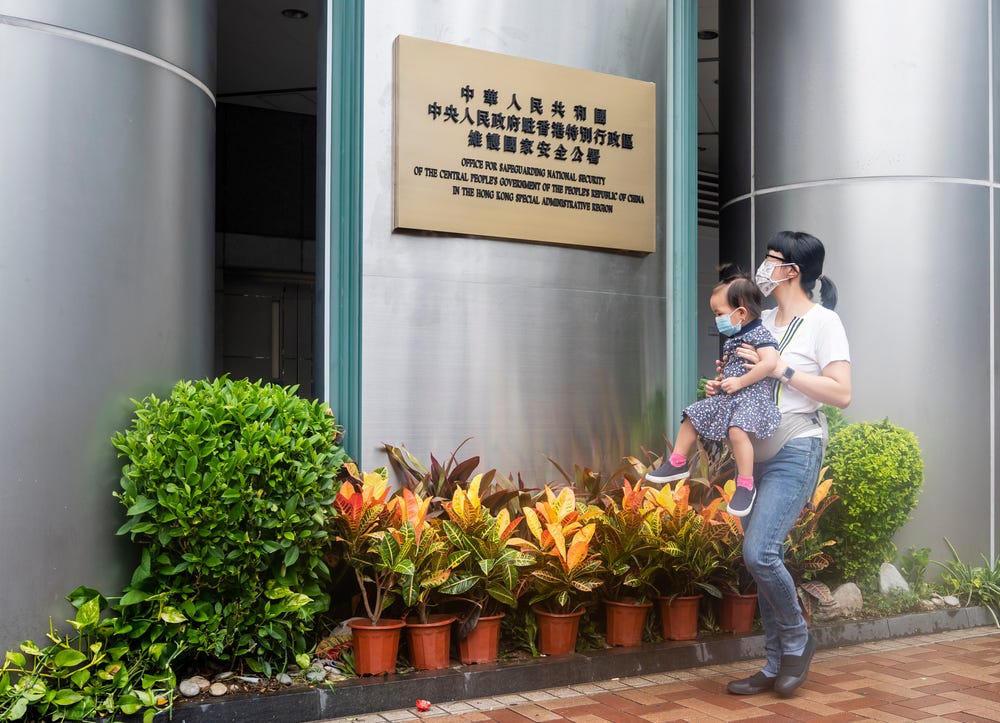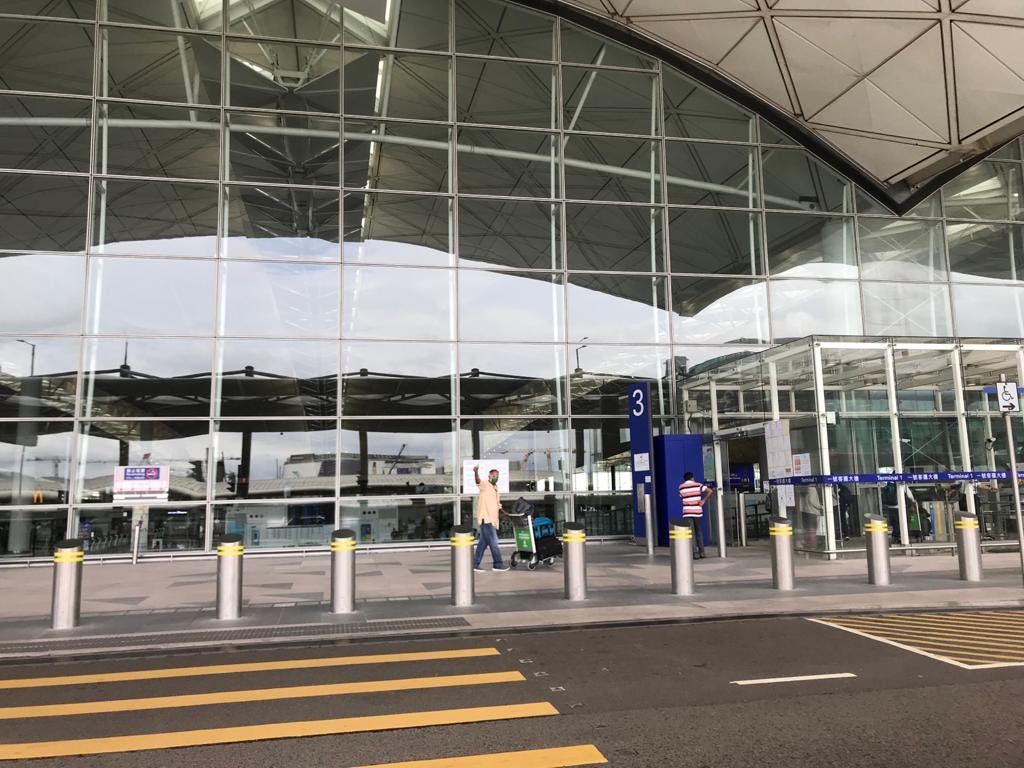When fear stalks a city
Hong Kong's reputation as one of the safest places to live and work is being steadily eroded as new security laws spread uneasiness and dread
By Hari Kumar
It was an unexpected call from a long-time Hong Kong resident as I boarded the flight to New Delhi: “Good to hear that you had no problems and were not stopped at the airport. You never know as things are a bit crazy here now,” said my friend who is a top professional and been in the city for decades. Relief was very evident in his voice.
It was something that you never imagined to hear in Hong Kong.
In the 18 years I spent in the city, I had never broken any law, not even delayed my tax payment. My friend’s worry was linked to a satirical column I had written for a few weeks earlier this year.
Those articles could be seen as an attempt to “provoke hatred of the regime,” another friend had warned as we messaged goodbyes.
When I shifted to Hong Kong in 2003, the question often raised was, “is Hong Kong safe?” At that time, Sars had brought the city to its knees. The virus that infected thousands of people; sent the stock market into a tailspin and crashed the property market. But in a few months, everything was brought under control, and the city bounced back.
In 2021, as another coronavirus ravaged countries worldwide, Hong Kong became, again, gripped by fear – not so much due to Covid-19, but due to the tightening grip of the Chinese Communist Party (CCP).
The fear of the authorities using vaguely defined National Security Law (NSL) to silence critics meant everybody has a reason to worry about something or the other. Even humming any song sang in protest rallies could see you charged with sedition. And some of the cases slapped on activists related to incidents that took place well before the NSL was enacted in June 2020.
Whether you were a journalist, lawyer, or a teacher, something you did, wrote, taught, or even you just stood on the sidelines observing a protest could be a black mark against you.
Beijing enacted the NSL, had it signed by President Xi Jinping, and enforced it on Hong Kong, all in one day, the day before the 23rd anniversary of the city’s handover to China by its former colonial masters, Britain. As the central government released the details of the law, a senior colleague in the newsroom going over its provisions let out a stream of profanities – the new piece of legislation was worse than even the most pessimistic expectations.
It was a game-changer. The One Country, Two Systems principle, the brainchild of the paramount leader Deng Xiaoping that promised the continuation of Hong Kong’s way of life and its judiciary’s independence for 50 years after the handover in 1997, has been clearly overridden by Beijing.
The authorities justified this by citing the tumultuous protests that erupted in 2019 over the Hong Kong government’s clumsy attempt to change its extradition laws, which later morphed into a fiery and often violent protest and a list of demands, including democracy. Beijing saw it as trouble fomented by people who are not “patriotic” enough and acting in collusion with foreign powers.
As the pandemic restrictions ended mass protests, authorities started cracking down using the new laws, which gave police the power to detain people on ambiguous charges and made it virtually impossible for suspects to get bail. The first targets were opposition politicians, lawmakers, activists, and student leaders. Dozens of them are still in jail and could face prison terms that range from a few years to life term.
One of the most prominent among them is the founder of Apple Daily newspaper and a rags-to-riches tycoon, Jimmy Lai, who has been slapped with a slew of cases, including subversion and financial fraud. Lai, who has enough connections to merit a one-to-one meeting with US Vice-President Mike Pence during a Washington visit, has been a very vocal critic of the CCP. His paper has time and again targeted also the Hong Kong government with its investigative reporting.
China has clearly marked Lai as an enemy of the state and has gone after him and his business empire with all their might. It began with a few raids on his businesses and a few cases against him, his close associates, and family members. Then they moved in big-time; froze all the assets of his newspaper, thus forced its closure in June this year.
It didn’t end there. Soon top editors of Apple daily were also hauled away over charges that the paper published articles that called for economic sanctions and other actions against Beijing over its Hong Kong policies. One of them, Lo Fung, was the editor of its English website and the only person I had contact with, but only through emails. I had never met him in person.
The link looked pretty tenuous to me. I didn’t fit the bill of high-profile writers whose columns in different media were scathingly critical of the Hong Kong government and its leaders. My articles in the Apple Daily were fictional pieces that occasionally made a mild dig at some government policies, the greed of people, and society’s double standards. They didn’t threaten to upend the mighty CCP’s seven-decades of grip on power.
But what the new security law had done was to spread the fear of the unknown as the red lines were never clearly marked. So, you never knew if you have crossed the line or not. But I was regularly getting queries of concerns from people who wished me well.
The mere association with the Apple Daily was enough for some people to get worried, as Beijing was always ham-fisted in its approach.
“Communist parties don’t like satire,” said one veteran journalist who had plenty of experience with communist movements over the past few decades.
Soon this starts working on you. Will I hear a knock on my door too, I often wondered, despite knowing well that there are much bigger fish out there that Beijing will go after. Of course, the police have not targeted any expat journalist over any security law violation was also a comforting thought. But at the back of the mind, the thought of a midnight knock did linger.
I was planning to shift back to India in early 2021, but things got delayed with pandemic disrupting air travel. As the delays dragged into weeks and months and the crackdown on media intensified, there was a nagging doubt: can something that I wrote as a joke, a fictional tale, be construed as aiding and abetting the enemy?
This imagined fear is precisely what the CCP or some of its subalterns in Hong Kong wanted to spread.
This was not a problem that confronted media people alone. A teacher in a prestigious university put it succinctly: “If I were in China, I know the limits as they are clear. I can teach my students without going into problematic areas. But in Hong Kong, we don’t know what is allowed and what is not. Even in entirely non-political subjects, like the information technology, there are areas like surveillance which could lead to potentially dicey debates.”
There are some who live in a bubble protected by their wealth and feel safe enough as they feel their apolitical lifestyle will shield them. But the history of the CCP could be a troubling reading for some of them.
Some people are warning of a purge in Hong Kong on the lines of the Cultural Revolution during Mao’s time when so-called enemies of the communist party, real or imagined, were arrested, tortured, publicly humiliated, or vanished.
It is an irony that when Mao’s Red Brigade was creating havoc, people fled to Hong Kong to seek refuge. Those who sought safety in the British-ruled colony transformed the city into one of the most successful urban experiments in history. Or an accident of history, as French writer and analyst Pascal-Emmanuel Gobry, described in 2016.
“Hong Kong provided millions of Chinese fleeing the horrors of Mao’s regime with a shot at a better life and in the process turned into one of the most prosperous and freest places on Earth.”
“Hong Kong was run autocratically by a British civil service appointee, but inhabitants had the right to free speech, petition, and protest, and the government was accountable.”
That is what Britain handed over to China in 1997, a city where people had civil rights but were not too bothered about democracy and were happy making a career or chasing their dreams of a business empire. It is what attracted people from all over the world to this city. All Beijing had to do was to ensure that it remained that way. But that didn’t happen.
Sure, the city has its warts and all. Densely packed districts, shoebox-like apartments, a cartel of tycoons who have hijacked the policies to suit their empires, a government insensitive to the plight of its poorest, an old-boys network that still nurses a colonial hangover… the list is long. But through all of this, there is one thing that Hong Kong offered – a sense of fairness.
It doesn’t matter if you were rich, poor, expat, or local. The city offered you basic security, civil rights, and a shot at prosperity. The taxes were low, and there was the rule of law. As long as you stayed on the right side of the law, you had nothing to fear; and its police force was billed as Asia’s finest for its professional and just approach despite the pressures of a rich society.
But all that is changing. The subject that comes up for discussion at almost every gathering lately is people leaving the city for good. Not just expats who had made the city their own, but also people who were born and brought up there. Many fear they and their children have no future as Beijing strips Hong Kong of almost every quality the city was known for.
A Bloomberg report said a decline of more than 15,000 primary and secondary students in Hong Kong schools reflected families leaving Hong Kong.
Some high-profile journalists have announced that they will no longer write opinion pieces because they feel the freedom they enjoyed in the city is no longer exists. Some others have moved abroad. A British writer fled this week and announced from abroad that he got a tip-off that he was being targeted by groups linked to the pro-Beijing side. And, then, there are others who have left quietly without much fanfare.
A friend who drove me to the airport said I was the third Indian journalist he was driving to the airport in a matter of few days, and all of them were unsure if and when they would return.
Hong Kong has seen exoduses before, notably in the 1980s and 1990s against the backdrop of China gaining control of the territory, as many feared the uncertainties ahead.
The driving force behind the exodus this time is not uncertainty but the certainty that Hong Kong has changed for ever.






